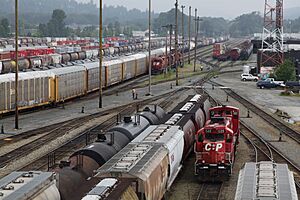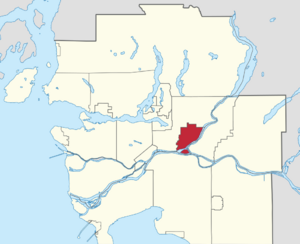Port Coquitlam facts for kids
Quick facts for kids
Port Coquitlam
|
|||||
|---|---|---|---|---|---|
| City of Port Coquitlam | |||||

Railway yard in Port Coquitlam
|
|||||
|
|||||
| Nickname(s):
"PoCo"
|
|||||
| Motto(s):
"Working Together For The Future"
|
|||||

Location of Port Coquitlam in Metro Vancouver
|
|||||
| Country | Canada | ||||
| Province | British Columbia | ||||
| Regional district | Metro Vancouver | ||||
| Incorporated | March 7, 1913 | ||||
| Government | |||||
| • Type | Mayor-council government | ||||
| • Body | Port Coquitlam City Council | ||||
| Area | |||||
| • Land | 29.16 km2 (11.26 sq mi) | ||||
| Elevation | 30 m (100 ft) | ||||
| Population
(2021)
|
|||||
| • Total | 61,498 | ||||
| • Estimate
(2023)
|
67,151 | ||||
| • Rank | 93rd in Canada | ||||
| • Density | 2,108.7/km2 (5,462/sq mi) | ||||
| Time zone | UTC-8 (Pacific Standard Time) | ||||
| • Summer (DST) | UTC-7 (Pacific Daylight Time) | ||||
| Forward sortation area |
V3B - V3C
|
||||
| Area codes | 604, 778, 236, 672 | ||||
Port Coquitlam (pronounced koh-KWIT-ləm) is a city in British Columbia, Canada. It is one of 21 cities and towns that make up Metro Vancouver. This city is located about 27 kilometers (17 miles) east of Vancouver. You can find it on the north side where the Fraser River and the Pitt River meet.
Port Coquitlam shares its borders with Coquitlam to the north and west. Across the Pitt River to the east is Pitt Meadows. The city is divided by the Lougheed Highway and the Canadian Pacific Kansas City railway. People often call Port Coquitlam "PoCo" for short. It is the 93rd largest city in Canada by population.
Contents
History of Port Coquitlam
The land where Port Coquitlam now stands was home to Indigenous peoples for a very long time. The Kwikwetl'em people, part of the Coast Salish people, lived here most recently.
Early European Settlement
The first European settlers started farming near the Pitt River in 1859. A big reason for the city's growth was when the Canadian Pacific Railway moved its main freight station from Vancouver to "Westminster Junction." They built a special railway line to the port of New Westminster in 1911. Port Coquitlam officially became a city on March 7, 1913.
From Farmland to Modern City
Port Coquitlam was first developed mostly as farmland. But as Vancouver grew bigger and more crowded, Port Coquitlam started to change. It became a place for suburban homes, especially in the northern and southwestern parts. Today, the city has a mix of different businesses. These include metal factories, high-tech companies, and transportation services.
Population and People
In the 2021 Canadian census, Port Coquitlam had a population of 61,498 people. These people lived in 22,884 homes. This was a small increase from its 2016 population of 58,612. The city covers an area of 29.16 square kilometers (11.26 square miles). This means about 2,108 people live in each square kilometer.
In the late 1990s, the population grew quickly. Many new people moved to the city, including immigrants. By 2001, about 25% of the people in Port Coquitlam were immigrants. For most people (76%), English was their first language.
Historical Population Growth
Port Coquitlam has grown a lot over the years. Here's how its population has changed:
| Historical populations | ||||||||||||||||||||||||||||||||||||||||||||||||||
|---|---|---|---|---|---|---|---|---|---|---|---|---|---|---|---|---|---|---|---|---|---|---|---|---|---|---|---|---|---|---|---|---|---|---|---|---|---|---|---|---|---|---|---|---|---|---|---|---|---|---|
|
|
|
||||||||||||||||||||||||||||||||||||||||||||||||
Languages Spoken in Port Coquitlam
The 2021 census found that English is the main language spoken at home for 62.4% of the people. Chinese languages are the next most common first language. About 8.2% of residents speak Chinese languages, including 4.5% who speak Cantonese and 3.4% who speak Mandarin.
Other common first languages include Persian (3.0%), Korean (2.6%), and Tagalog (2.4%). About 0.9% of people speak French as their first language. Some residents speak both English and another language at home.
| Rank | Mother tongue | Population | Percentage |
|---|---|---|---|
| 1 | English | 37,840 | 62.4% |
| 2 | Cantonese | 2,705 | 4.5% |
| 3 | Mandarin | 2,075 | 3.4% |
| 6 | Persian | 1,840 | 3.0% |
| 5 | Korean | 1,565 | 2.6% |
| 4 | Tagalog | 1,435 | 2.4% |
| 7 | Spanish | 1,110 | 1.8% |
| 8 | Punjabi | 960 | 1.6% |
| 9 | Russian | 935 | 1.5% |
| 10 | Polish | 625 | 1.0% |
Religious Groups
The 2021 census also looked at religious groups in Port Coquitlam. Almost half of the people (49.4%) said they had no religion. About 39.7% of people follow Christianity. Other religions include Islam (4.3%), Sikhism (2.2%), Buddhism (1.4%), and Hinduism (1.3%).
Getting Around Port Coquitlam
Port Coquitlam is mostly a suburban city. This means people rely a lot on roads to travel and move goods. Two important roads are Shaughnessy Street and Lougheed Highway. Shaughnessy Street runs north to south, and Lougheed Highway runs east to west.
Public Transportation
TransLink provides many bus routes throughout the city. A popular bus route is the 159, which connects southern Port Coquitlam to the SkyTrain at Braid station. Other bus routes include the 160, which links Port Coquitlam to Vancouver. It goes through Coquitlam Central Station and Moody Centre station. The 173/174 bus routes travel in a loop through the northern part of the city. They connect to regional buses at Coquitlam Central and Port Coquitlam station.
The main bus stops in the city are Port Coquitlam Centre and Port Coquitlam Station. Other parts of Port Coquitlam are served by smaller Community Shuttles.
Future SkyTrain Extension
Port Coquitlam is the only one of the "Tri-Cities" (Port Coquitlam, Coquitlam, and Port Moody) that does not have a SkyTrain station. However, this might change in the future. There are plans for the Millennium Line to extend into downtown Port Coquitlam. When the Evergreen Extension was built, the first part of the track for this future extension was already put in place at Coquitlam Central station. This would allow trains to go either north to Lafarge Lake–Douglas or east to downtown Port Coquitlam.
A study was done in 2020 to see if this extension was possible. Both Mayor Brad West and the Port Coquitlam City Council support the idea. However, as of 2022, there is no money set aside or a final plan for this extension.
Major Roads and Bridges
The Lougheed Highway goes through Port Coquitlam. It runs from Coquitlam in the west to the Pitt River Bridge in the east. This highway can get very busy, but it's one of the main roads in the area.
The Mary Hill Bypass, also known as Highway 7B, runs next to the Fraser River. It goes from the Pitt River Bridge in the east to the Port Mann Bridge in the west.
The Canadian Pacific Kansas City railway has a large rail yard in the middle of the city.
In October 2009, a new cable-stayed bridge called the Pitt River Bridge opened. It has seven lanes and replaced two older swing bridges. This new bridge crosses the Pitt River and connects Port Coquitlam to Pitt Meadows.
In March 2010, the Coast Meridian Overpass opened. This new four-lane cable-stayed bridge gives people another way to travel north to south over the Canadian Pacific Railway yard.
Trails and Biking
A 25.3-kilometer (15.7-mile) hiking and biking trail, called the Traboulay PoCo Trail, goes all the way around the city. In August 2018, a company called U-bicycle started a bike-sharing system in the city. This allows people to rent bikes without needing a special docking station.
Education in Port Coquitlam
Port Coquitlam has many schools for students of all ages.
Public Schools
Public schools in Port Coquitlam are part of School District 43 Coquitlam.
Secondary Schools (High Schools)
- Riverside Secondary School
- Terry Fox Secondary School
Middle Schools
- Citadel Middle School
- Kwayhquitlum Middle School
- Maple Creek Middle School
- Minnekhada Middle School
- Pitt River Middle School
Elementary Schools
- Birchland Elementary
- Blakeburn Elementary
- Castle Park Elementary
- Cedar Drive Elementary
- Central Elementary
- Coquitlam River Elementary
- Glen Elementary (French Immersion)
- Irvine Elementary (French Immersion)
- James Park Elementary
- Hazel Trembath Elementary
- Kilmer Elementary (French Immersion)
- Mary Hill Elementary (French Immersion)
- Westwood Elementary
The Conseil scolaire francophone de la Colombie-Britannique operates one French-language school for both primary and secondary students: école des Pionniers-de-Maillardville.
Private Schools
- Archbishop Carney Regional Secondary School
- Our Lady of the Assumption Elementary
- British Columbia Christian Academy
- Hope Lutheran Christian School
- Ecole des Pionniers de Maillardville (French)
- Sprott Shaw College (for older students after high school)
Famous People from Port Coquitlam
Many notable people have lived in Port Coquitlam:
- Rene Tosoni, a former Major League Baseball player for the Minnesota Twins.
- Sukh Chungh, a Canadian football player.
- Zach Hamill, a professional hockey player drafted by the Boston Bruins.
- Betty Fox, an activist for cancer research and mother of Terry Fox.
- Terry Fox, a famous athlete and cancer treatment activist. He is known for his "Marathon of Hope" run across Canada.
- Ian Tracey, an actor who has won Leo and Gemini Awards.
- Tyler Shaw, a singer and songwriter.
- Eric Reprid, an Asian-Canadian rapper and songwriter.
- Sophia Reid-Gantzert, an actress and dancer.
See also
 In Spanish: Port Coquitlam (Columbia Británica) para niños
In Spanish: Port Coquitlam (Columbia Británica) para niños
 | Frances Mary Albrier |
 | Whitney Young |
 | Muhammad Ali |




